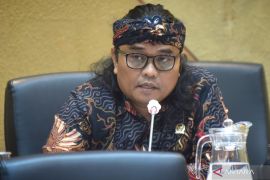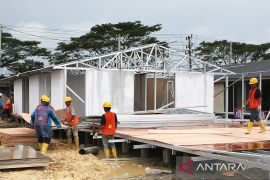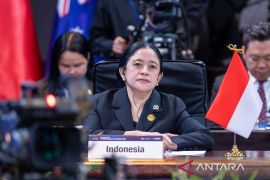"I praise the government's hard work in achieving the vaccination target. This is a significant indicator of the success in handling COVID-19," Commission IX member of the House Edy Wuryanto noted in a statement here on Friday.
Based on the Health Ministry's data as of Thursday at 18:00 WIB, Wuryanto noted that 146,305,278 people had received the second dose of vaccination, or equivalent to 70.25 percent.
Wuryanto stated that this achievement could build immunity among the Indonesian people. Herd immunity is apparent from the current situation wherein the high spread of infection caused by the Omicron variant does not increase the number of hospitalizations. Most of the infected people only show mild to moderate symptoms.
"The death rate is also lower," Wuryanto remarked.
On account of these conditions, he advised the government to immediately prepare a transition scenario from a pandemic to an endemic stage, so that economic recovery can run well.
"I urge regions that had yet to reach the vaccination target to continue to be proactive by conducting door-to-door vaccinations," he stated.
Related news: Government urges 20 provinces to pursue second dose vaccination target
Meanwhile, member of Commission IX of the House Yahya Zaini also remarked that the achievement of national vaccination was worth praising. Zaini noted that the achievement was the result of hard work put in by the central and regional governments coupled with assistance from the military, police, and the State Intelligence Agency (BIN).
"We should be proud of the country's vaccination achievement, which is ranked 4th globally. This is an achievement that deserves to be praised," Zaini noted.
However, the House member encouraged related parties to continue to deliver further achievements. This is especially for vaccinations for the elderly that had only reached 70.17 percent for the first dose and 45.36 percent for the second dose of vaccine, and only some 20 provinces have recorded vaccination achievements crossing 60 percent.
Zaini is also optimistic that efforts to transition from a pandemic to endemic stage would be made carefully and would take into account the advice of experts, especially epidemiologists.
"I am optimistic that the government would not be in a hurry to establish an endemic status, while the number of COVID-19 cases are still high. It will be detrimental to the people," he affirmed.
Meticulous efforts are required, as the transition in status will change strategies and policies for handling the pandemic, including the budget.
Related news: Need to vaccinate 70-percent population to enter endemic stage: BRIN
Zaini called on the government to take a cue from countries that have and have not determined the endemic status.
"(The government) needs to determine several important factors, as each country has a different level of health resilience," according to Zaini.
In the meantime, Commission IX member of the House Rahmad Handoyo concurred with Indonesian President Joko Widodo (Jokowi), who emphasized that there was no need to rush to change the status from a pandemic to an endemic. He emphasized that the transition required careful preparations.
According to Handoyo, apart from vaccinations, changes in the people's behavior should be enforced, so that the transition from pandemic to endemic status can run well. However, he expressed regret over the fact that despite high vaccination achievements among several countries, their fatality rate too remained high.
Hence, Handoyo emphasized the need to enforce changes in the people's behavior, especially in the implementation of health protocols.
"If vaccination has gone well, then the health protocols are also implemented properly. I think we can make a transition. However, I do not think it can happen now," he stated.
Related news: President against rushing to change pandemic status to endemic: KSP
Translator: Katriana
Editor: Suharto
Copyright © ANTARA 2022












